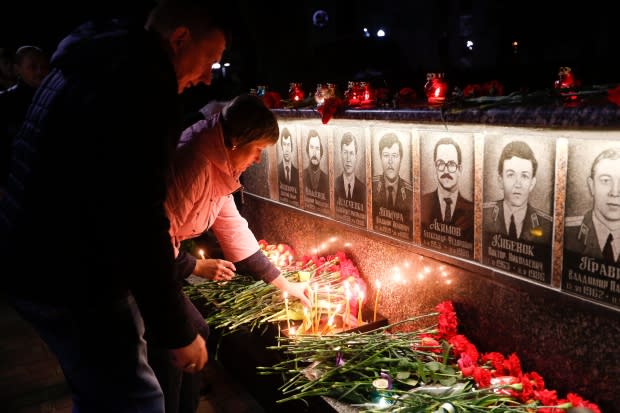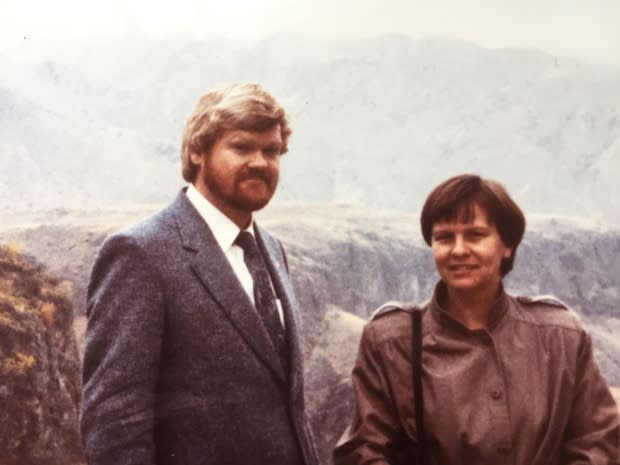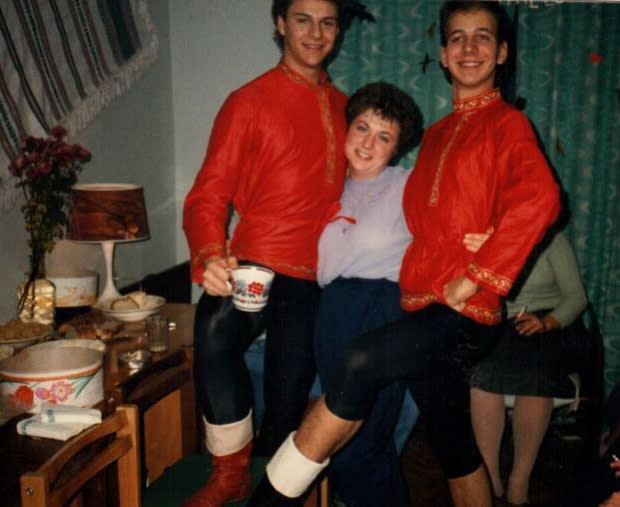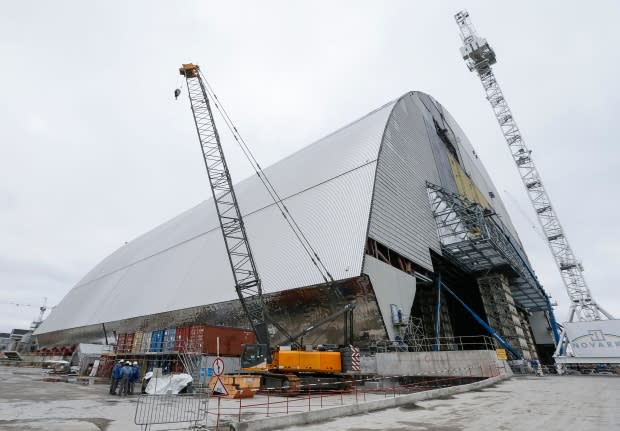'We should get the hell out of here': Ex-diplomat recalls mission to rescue students in Chornobyl disaster
In the spring of 1986, Hector Cowan, a 38-year-old diplomat at the Canadian Embassy in Moscow, got a first clue about the Chornobyl nuclear accident while at the breakfast table, with his wife, Hilda, and three young children.
He was listening to the BBC news on a shortwave radio. "It wasn't too easy, because the Soviets were still routinely jamming it," he recalls.
That morning there was a report about high radiation warnings detected by a Swedish nuclear plant, major international news that was regarded as alarming
It was April 28, just two days after a failed test caused an explosion and fire at the Chornobyl nuclear power plant in Soviet Ukraine, resulting in a massive radiation leak now drifting northwest into Europe.
History remembers it as the world's biggest ever civilian nuclear accident. For days, the Soviet government kept it secret from the world and its own citizens. This resulted in hundreds of thousands of people unknowingly being exposed to radiation.
The horror and lies of the nuclear accident contributed to the eventual collapse of the Soviet system, Cowan says. It is the subject of a blockbuster television dramatization called Chernobyl produced by HBO, which debuted earlier this month.
For Cowan, just six months into his Moscow posting, Chornobyl was to test his mettle. He found himself on his way to Ukraine to warn the 17 Canadian students the embassy knew were in Kyiv.
Arriving at the Moscow embassy that day, Cowan discovered "most of my colleagues knew even less than I did."
They were getting telephone calls from Western media about reports of a radioactive cloud detected in Scandanavia and the belief among nuclear experts that it had come from Soviet territory.

Lack of information
His boss, Ambassador Vernon Turner, remembers they knew nothing about the fire raging at the reactor, or of the mass evacuations of tens of thousands of Soviet men, women and children from the nearby town, Prypyat, which was highly radioactive.
"It was unnerving because of the initial effort of the Soviets to keep a lid on it," Turner, now 89, said in a phone interview from Ottawa.
In an era without computers or cellphones, the diplomats relied on the telephone and the fax machine to communicate with other officials, says Cowan, now retired and living in Cobourg, Ont.
"We both knew someone had to go and I was the obvious choice as consul," Cowan said. The students had to be warned.
"He was taking a risk, and I was taking a risk by sending him. But I did," recalls Turner.
"I knew that if there was an accident there was bound to be radiation. He was brave, but he saw it as part of his job."
No Western diplomat had yet been allowed into the Ukraine, because the Soviet government was trying to hide the truth. "Travel was very restricted in those days. You couldn't just go anywhere without permission," says Turner.
Flying into Ukraine
But incredibly, late in the evening on Wednesday, April 30, the Soviet foreign ministry called Turner and said Cowan could go to Kyiv that same night.
"I went immediately to the airport and managed to get on a flight leaving around midnight," says Cowan.

Meanwhile, in Kyiv, 23-year-old Pat Tymchatyn from Saskatoon was busy with her life at the university, unaware of the severity of the accident just 100 kilometres away.
The daughter of a single mom who had come to Canada from Ukraine as a young child, she had won a bursary to study there from the Ukrainian Friendship Society (a Soviet propaganda agency). She dreamed of becoming a sovietologist.
Also in her dorm were three Canadian teenagers from Edmonton and a young married couple. There was also a group of Doukhobor students from B.C., totalling about 17 people.
'Life is progressing normally'
Tymchatyn, now 56 and an educator at Saskatchewan Polytechnic, kept all her letters from the era. On April 29, she wrote to her mother, "I suppose Grandpa and you are worried sick about the nuclear explosion that happened. Not to worry, life is progressing normally."
Soviet officials in Kyiv gave no public warnings, and May Day celebrations carried on as planned. Children played in the parks. Crowds gathered to watch bike riders zoom by in the "Race for Peace."
When frantic Canadian parents started calling the university to warn their kids, the Soviet officials cut the dorm's phone line, Tymchatyn says.
"We knew something was up when the Finnish kids left on a plane sent for them by the Finnish government on the 29th."
She still didn't worry, because the Soviet university deacon reassured her. "He said if it was serious, did I think they would leave us there?"
"He's right," she wrote to her mother. "P.S. Remember worrying never solved anything. Keep smiling!"
Cowan landed in Kyiv at 3 a.m. May 1. He had limited Russian language and no knowledge of the city but hopped in a cab and sped to the university dorm.
"I knocked on the door of one of the Canadians students. I had a bottle of scotch. We had a few drinks," he said
"He didn't know much about the accident. I slept on his dorm floor."
Students are skeptical
The next day Cowan convened the students. "I gave my spiel: We are 130 kilometres from the world's worst nuclear disaster, we should get the hell out of here."
The students were skeptical and asked, "If it's so dangerous, why are you here? What do you know? Where do you get your information from?" Cowan says.

"We know that in places like Sweden, the radiation levels are very high," he explained to them.
Tymchatyn was a skeptic. "What about all the people here?" she remembers challenging Cowan.
It took Cowan seven days to get the students "rounded up" and arrange transportation out of Ukraine.
"We travelled back to Moscow by train as a group. It was full of Soviet children being sent by their parents to stay with friends or relatives elsewhere in the Soviet Union, to escape the radiation. People asked me what I knew. There was a sense of fear," says Cowan.
Tymchatyn decided to stay until her plane ticket date at the end of June, thinking it wasn't dangerous and unwilling to spend the extra money.
Advised to drink vodka
The Soviet officials broadcast futile advice on ways to protect themselves.
On May 8, she wrote, "Dear Mom, right now I am standing in a line for vodka. Who would ever think I would be standing in line for liquor? The supervisor said that one should drink vodka, it helps lessen radiation in one's body. I'm sure it will lessen the strain of waiting to see what will happen.
"It was a very hot May, but by then we knew we couldn't swim by the Dnipro river. We couldn't open the windows, we were told not to use much water and cover our heads," Tymchatyn says.
"When we went to the market, soldiers were there with Geiger counters measuring radiation levels."
On May 13, 1986, Tymchatyn was a little less self-assured when she wrote to her mother. "Thirty-five of 204 (acknowledged people) are in critical condition — meaning no hope. No one is saying anything about the soldiers who were sent out there to fight the fire."

By this time Cowan had returned to Moscow with the students.
"I was pleased he had found most of the students," says Turner. "He rose to the occasion."
Turner sent Cowan to Canada for radiation testing. "I was met at Heathrow in London by guys in white suits with Geiger counters. They said I was radioactive, but basically OK."
Hilda recalls, "Hector had a pair of very good shoes. When he got back they tested them. They were way off the charts. They put them in a vault in the embassy. Ten years later when we were back in Moscow, he went to the vault to look for them. They were gone. So someone went away with his radioactive shoes."
Tymchatyn returned to Canada in the summer of 1986 and as the years went by she became more aware and concerned about the lasting effects of the radiation fallout from Chornobyl.

"I spent the next almost two decades reading anything and all about Chornobyl. I told anyone who would listen that nuclear was not the way to go. You can't see it, smell it or taste it but its effects are devastating.
"On the eve of the 26th of April, I always think about Chornobyl. I think of it the day before. I think of it the week before."
And incredibly, when she had a child 13 years ago, the baby was born on April 26.
"My daughter is an environmentalist and she's in Grade 7. She talks about species extinction. We haven't learned anything from history."
Turner remembers Chornobyl "as the most unnerving experience I had in my 4½ years in the Soviet Union."
Cowan went on with his family to subsequent postings as consul general in St. Petersburg and ambassador in Kazakhstan. He saw the Soviet regime through its final stages.
"Chornobyl killed the Soviet Union," he says. "It was the straw that broke the camel's back because the Soviet Union couldn't hide it."


